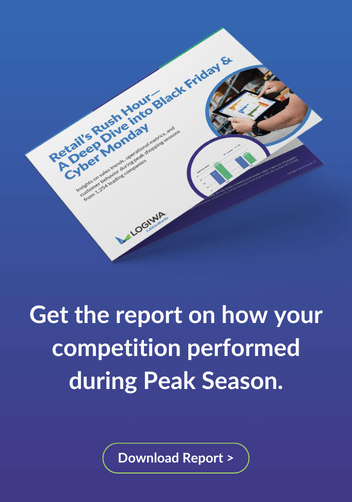How To Scale Your Business Using 3PL White Labeling
3PL WMS services save companies time and money while enabling them to maintain a consistent brand image. As business owners look for ways to outsource peripheral activities in order to focus on their core competencies, white label solutions become more and more attractive.
The thing is, “3PL” (short for third-party logistics) can mean multiple things. Working with a 3PL company could mean anything from implementing a cloud-based transportation management system (TMS) to completely outsourcing your shipping and logistics. As a result, when talking about 3PL white labeling, it’s important to understand what exactly is being white labeled.
In our 3PL guide, we’ll help you understand:
BONUS: Before you read further, download our Warehouse Management Software Whitepaper to see how Logiwa allows you to automate your warehouse with the most flexible and dynamic technology on the market
Three Types of 3PL Services
Let’s start by clarifying the three chief categories of 3PL services:
- Transportation management systems
- Managed transportation services (MTS)
- Fully outsourced transportation management
The extent of your white labeling – and whether providers can even offer white labeling- depends on which of these 3PL WMS services you’re seeking from your 3PL provider.
Transportation Management System
A TMS is software that helps optimize the receiving and shipping process. It helps manufacturing plants, warehouses, and distribution centers gain visibility over the entire inbound and outbound logistics process. From an operational point of view, it also helps shippers keep costs low by picking the best route – one that balances low costs with timely delivery.
A TMS can make a real difference, but, surprisingly, many companies don’t implement one into their operations. According to Gartner, 85% of shippers don’t use a transportation management system. The same report shows those that do implement a TMS tend to be large companies. This isn’t surprising though. For shippers with a global logistics operation, a warehouse management system is essential, if only for maintaining visibility over the entire endeavour.
Even so, the software can also make a difference for small- to mid-sized companies. According to one report, companies that regularly monitor their shipping expenses and shipping partners using a transportation management system can cut their transportation expenses by up to 30 percent.
In the past, implementing a warehouse management software may have been cost-prohibitive. Today, the widespread use of cloud technology has made TMS software much more accessible. In fact, since so few small- to medium-sized businesses use transportation management software, there’s a huge opportunity for early adopters to get a leg up on their competition.
Some companies choose to implement a white label system. With a white-labeled solution, the system displays the company’s brand. So, internal employees and external partners associate the system with the company.
As a result, companies don’t have to build their own transportation system from scratch and can leverage their brand recognition, reputation, and company messaging. If their speciality is warehousing or inventory management or manufacturing, they can focus on those core competencies while benefiting from the value of a transportation management system.
Managed Transportation Services
Of course, it’s not just price that restricts companies from hopping on the TMS train—it’s expertise as well. Transportation management systems can be difficult to learn and training employees takes time. Plus, they may need to learn additional techniques or best practices to get the most value out of the TMS.
To this end, 3PL WMS companies offer managed transportation services (MTS). With an MTS, your company has access to both a transportation management system and the people with the knowledge and experience to leverage its features and insights.
That said, managed transportation services aren’t a fully outsourced solution. Your organization still retains ultimate responsibility over your shipping KPIs. The difference is that your business has experts who monitor your shipping activity, provide reports, and offer recommendations on how to make improvements.
In this case, 3PL white labeling would mean your company’s branding is on the transportation management system, since the outsourced experts providing assistance would be interacting with your internal team.
Fully Outsourced Transportation Management
As the name implies, fully outsourced transportation management means completely handing over the shipping and logistics side of your operation to a 3PL WMS company. This third-party logistics company acts as your organization’s “transportation division,” so to speak. They are responsible for the planning and execution of your inbound and outbound logistics.
Taking ownership over the logistics process means being held accountable for certain KPIs.
For instance, if your company wants to see specific improvements, like a 10% reduction on annual transportation costs or a 15% percent improvement in on-time delivery rates, then these expectations would be worked out in the contract. Speaking of agreements, there should certainly be a contract. An arrangement like this is typically long-term in order to make it worthwhile for the 3PL and give them time to demonstrate value.
How 3PL White Labeling Helps Brick-and-Mortar Retailers Compete With Amazon
While 3PL white labeling can be helpful to manufacturers and warehouses, it also presents enormous value to retailers. With a global marketplace, it’s not enough for retailers to just have a physical presence. You need an ecommerce channel, and it had better be competitive.
The “Amazon effect” has had a transformative impact on the ecommerce world—it is the bar that all online retailers must meet or surpass. Thanks to Amazon, customers expect:
- An easy user interface
- Excellent search functionality
- Tailored recommendations
- Fantastic customer service
- And, above all, delivery in two days or less
Amazon has the technology, logistics network, and cash to compete on delivery. Other retailers may not have the same resources at their disposal, but letting delivery times slide isn’t an option. Instant gratification is part of the shopping experience. If online retailers can’t come as close to “immediate” as possible – like Amazon does – the incentive to shop online diminishes.
That’s where a third-party logistics company comes in. It provides the network and expertise needed to help retailers compete with Amazon. At the end of the day, Amazon’s biggest competitive advantage is its distribution network and technology.
On the other hand, a private online brand’s competitive advantage is its products. If a small- to mid-sized retailer can focus on its products while also getting those products to customers quickly and accurately, it can thrive in the current ecommerce environment.
With 3PL software, an outsourced logistics provider can become an extension of the company’s brand. This is important since one of the challenges of logistics outsourcing is the separation between the brand and the delivery experience. White labeling also increases brand visibility and customer loyalty.
With Amazon, customer service and satisfaction is built into the company’s ethos. With a logistics company, the focus is meeting its contractual obligations. As a result, they may not put the same effort into, say, the unboxing experience or worry about providing the detailed ETA information customers are used to receiving from Amazon.
Through white labeling, a logistics company may use the company’s own packaging or respond to customer inquiries as an extension of the brand itself. This could help create a more seamless experience from the customer’s view.
That said, white labeling often applies to products themselves (e.g., a TMS software solution) rather than a service (e.g., a fully outsourced transportation management solution). Therefore, ensuring an appropriate “white label service” will require conversations, negotiations, and contractual refinements with your transportation partner.
Multiple sales channels, warehouses, and clients? We got you. Logiwa’s all-in-one dashboard gives you a bird’s eye view of your clients’ inventory. Learn how Logiwa allows you to give your customers access to their own custom portal that puts them in control of their business information
3PL White Labeling Solutions for Dropshippers
Over the last few years, digital marketing, ecommerce, and global communication networks have come together to produce the dropshipping supply chain strategy. Through dropshipping, retailers can ship products they’ve never even seen from wholesalers they’ll never meet.
A retailer simply sets up an online store and fills it with products sourced from overseas warehouses or through marketplaces like AliExpress. They market these products through their digital storefront and promote the products through digital marketing channels like Google Ads, Facebook Ads, and Instagram.
Then, as customers place orders through the retailer’s site, the retailer enters the customer information into the third party retailer’s website to initiate the actual purchase. The customer receives the order and the dropshipper makes money off the difference between the retail price and the wholesale price.
When used ethically, dropshipping is a clever business model that allows consumers to access products they may not have otherwise seen. However, delivering a consistent customer experience presents a recurring issue with the dropshipping model.
A dropshipper’s competitive advantage is its digital storefront. Its purpose is to effectively market wholesale products and develop a brand experience.
When a customer receives a shipment in underwhelming packaging with a foreign mail service’s logo, it diminishes the customer experience and negatively impacts the brand.
On the other hand, working with a white label 3PL means your dropshipping customers receive orders in branded packaging, ensuring a continuation of the brand experience. In some cases, the vendor or wholesaler may offer this service themselves, saving online retailers the trouble of finding a 3PL that also offers branded packaging and the insertion of brand materials.
Here are a few best practices to keep in mind when pursuing a white label 3PL solution for your dropshipping business:
- Take the time to find a reliable wholesaler/vendor partner. A big mistake dropshipping companies make is working with any and every wholesaler. While this may work for a get-rich-quick scheme, if you’re hoping to build a sustainable, long-term business with a cohesive brand story, it’s important to find a reliable wholesaler who values you as a customer. These vendors will take your requirements seriously and act as an extension of your brand.
- Design communication protocols with your wholesaler. Once you have sourced a good wholesaler, it’s important to avoid a “set it and forget it” approach to your relationship. Regular communication with your supplier partner is important. Ensuring you’re on the same page and setting expectations ensures you aren’t surprised by delays or inaccurate shipments. Communication is particularly important if you have both a wholesaler relationship and a 3PL relationship.
- Enter into a contract with your wholesaler. You’re trying to find long-term partners that appreciate a relationship built on mutual value-generation. Solidify your expectations by entering into a contractual agreement with your wholesaler. This agreement should outline your service level agreement and KPIs, so the conditions of the engagement are clear.
- Create an approved list of shipping partners. The last thing you want is surprises on your carrier rates. If your wholesaler offers white labeling, but doesn’t have in-house 3PL expertise, get information on their regional carriers to ensure you’re always receiving the optimal rates. Since the cost will be passed on to you or your customers, your wholesaler won’t have much incentive to find the cheapest solution. Building an approved list of carriers into your agreement (with that list subject to change) can help avoid expensive surprises.
Building an À La Carte White Label 3PL Solution
While 3PL is used as a catch-all term for companies that offer help with warehousing and transportation, there are a number of tools, tasks, and processes that fall under this umbrella. For example, logistics involves the use of warehouse and inventory management software, order fulfillment software, transportation management software, and more.
Tech-savvy companies can build their own white label 3PL solution by picking tools à la carte and bringing them together to create their own logistics ecosystem.
Using White Label 3PL WMS Services Solutions on an As-Needed Basis
Your business may manage the order fulfillment process quite well on its own. But, if you find yourself struggling to keep up with demand during peak seasons, consider using white label 3PL WMS services on an as-needed basis.
If you’re used to keeping 100% control over your brand and operations, this may not appeal to you, but here are a few things to keep in mind:
- When you’re overloaded, you can’t reach as many people as you otherwise would, thereby hindering your business’s growth.
- Even if you do a fantastic job during the rest of the year, failing to satisfy customers when they’re most eager for your products (say, during the gift-giving season) can leave an awful taste in their mouths and turn off consumers who are trying your brand for the first time.
- Smart business owners focus on their core competencies. As demand grows, successful owners learn to let go of their non-specialties and hand them over to the experts, even if there are growing pains in the beginning.
Adopting a white label 3PL that will include your logo and return address on the packaging and ship your goods for you can help your business scale and keep your products moving when it matters most.
3PL White Labeling Helps Businesses Scale To Their Full Potential
Successful business owners emphasize the power of delegation, and outsourcing is its pinnacle. While maintaining visibility over all brand-related functions is crucial, especially delivery for ecommerce companies, discerning what’s within your expertise is vital. With Logiwa’s order fulfillment software, a 3PL’s white-labeled service can efficiently help you meet demand, captivate new customers, and elevate your business to unparalleled heights. Dive into the world of optimized logistics with Logiwa and unlock your brand’s true potential.
FAQs: 3PL white labeling
Q: What is the primary advantage of 3PL white labeling for businesses?
A: 3PL white labeling allows businesses to maintain a consistent brand image while outsourcing their logistics operations, ensuring a seamless experience for customers.
Q: How can 3PL white labeling help ecommerce companies?
A: Ecommerce companies can benefit from 3PL white labeling by ensuring that even outsourced deliveries maintain the brand’s look and feel, enhancing customer trust and satisfaction.
Q: What types of 3PL services can be white-labeled?
A: The article mentions three primary types of 3PL services that can be white-labeled: Transportation Management Systems, Managed Transportation Services, and Fully Outsourced Transportation Management.
Q: How can brick-and-mortar retailers compete with giants like Amazon using 3PL white labeling?
A: Brick-and-mortar retailers can use 3PL white labeling to offer a consistent brand experience from purchase to delivery, making them more competitive against major players like Amazon.
Q: How does Logiwa enhance the 3PL white labeling experience?
A: Logiwa’s order fulfillment software streamlines the 3PL white labeling process, ensuring businesses can efficiently meet demand, reach new customers, and scale effectively.
Adjust quickly to ever-changing fulfillment requirements with the most flexible WMS
Inventory Management
Improve your inventory across your supply chain.






